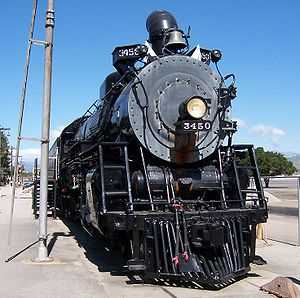ATSF 3450 class
| ATSF 3450 class | |
|---|---|
 | |
| Type and origin | |
| Power type | Steam |
| Builder | Baldwin Locomotive Works |
| Build date | 1927 |
| Total produced | 10 |
| Specifications | |
| Configuration | 4-6-4 |
| UIC classification | 2′C2′ h |
| Gauge | 4 ft 8 1⁄2 in (1,435 mm) |
| Driver diameter | 73 in (1,854 mm), later: 79 in (2,007 mm) |
| Length | 97 ft 11 in (29.85 m) |
| Weight on drivers | 198,000 lb (89.8 tonnes) |
| Locomotive weight | 343,900 lb (156.0 tonnes) |
| Locomotive and tender combined weight | 639,260 lb (290.0 tonnes) |
| Fuel type | Oil |
| Fuel capacity | 5,000 US gal (19,000 l; 4,200 imp gal) |
| Water capacity | 15,000 US gal (57,000 l; 12,000 imp gal) |
| Boiler pressure | 220 lbf/in2 (1.52 MPa), later: 230 lbf/in2 (1.59 MPa) |
| Firegrate area | 88 sq ft (8.2 m2) |
| Cylinders | Two, outside |
| Cylinder size | 25 in × 28 in (635 mm × 711 mm) |
| Valve gear | Walschaerts |
| Valve type | Piston valves |
| Performance figures | |
| Tractive effort | 44,250 lbf (196.8 kN), later: 43,300 lbf (192.6 kN) |
| Career | |
| Operator(s) | Atchison, Topeka and Santa Fe Railway |
| Number(s) | 3450–3459 |
| Disposition | 3450 preserved, remainder scrapped |
The Atchison, Topeka and Santa Fe Railway's 3450 class comprised ten 4-6-4 "Hudson" type steam locomotives built by the Baldwin Locomotive Works in 1927. Built as coal-burners, they were converted to oil-burning during the 1930s. At the same time, the locomotives were given 79-inch driving wheels instead of their original 73-inch, and the boiler pressures increased from 220 to 230 lbf/in2 (1.52 to 1.59 MPa). Combined, these changes reduced the starting tractive effort from 44,250 to 43,300 lbf (196.8 to 192.6 kN), but increased the top speed and efficiency. Their early service was in the Midwest, between Chicago, Illinois and Colorado; later, some were assigned to service in the San Joaquin Valley of California between Bakersfield and Oakland.
They were smaller and less powerful locomotives than the later 3460 class, but were capable of equivalently high speeds.
The first locomotive built, #3450, was donated by the Santa Fe in 1955 to the Railway and Locomotive Historical Society's Southern California chapter, and is preserved at the Society's museum in the Los Angeles County Fairgrounds at Pomona, California. It is not in operational condition but is preserved in good condition as a static exhibit.
Further images
-

3450 4-6-4 steam locomotive
-

Front of #3450
-

Side of #3450
References
- "Atchison, Topeka and Santa Fe 3450". Southern California Chapter, Railway and Locomotive Historical Society. Retrieved 2006-01-22.
- Barris, Wes. "Atchison, Topeka & Santa Fe Hudsons". SteamLocomotive.com. Archived from the original on 7 March 2006. Retrieved 2006-01-22.
- Glischinski, Steve (1997). Santa Fe Railway. Osceola, WI: Motorbooks International. ISBN 0760303800. OCLC 37567382.